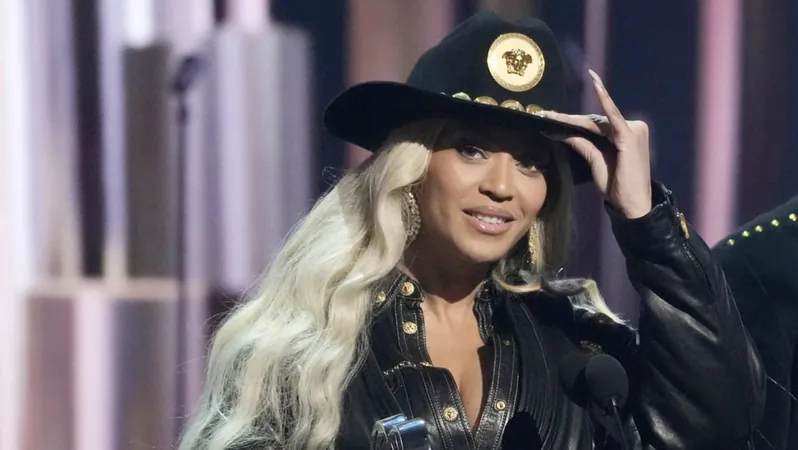
Yale University to Launch Groundbreaking Course on Beyoncé's Cultural Impact
2024-11-12
Author: Wei
Yale University to Launch Groundbreaking Course on Beyoncé's Cultural Impact
In an exciting development for music and cultural studies, Yale University is set to introduce a groundbreaking course focused on none other than pop icon Beyoncé. With a staggering 99 Grammy nominations under her belt, Beyoncé has established herself as one of the most influential figures in the music industry, making her life and work a fitting subject for academic scrutiny.
The course, aptly named “Beyoncé Makes History: Black Radical Tradition, Culture, Theory & Politics Through Music,” will delve into her illustrious career, starting from her self-titled album released in 2013 to the recent genre-blending project, Cowboy Carter. This one-credit class aims to explore how Beyoncé has successfully raised awareness and fostered engagement in critical social and political issues through her music.
Led by Professor Daphne Brooks from Yale’s African American Studies department, the curriculum will utilize Beyoncé's extensive body of work, including captivating footage of her live performances, as a lens through which students can study prominent black intellectuals, from the likes of Frederick Douglass to the iconic Toni Morrison. Brooks highlights the importance of examining how the significant philosophical contributions of these thinkers resonate with Beyoncé’s music, and how they sometimes challenge the traditional “black radical intellectual tradition.”
Beyoncé, full name Beyoncé Giselle Knowles-Carter, joins the ranks of other musical legends who have inspired university courses. Notably, subjects like Bob Dylan and Taylor Swift have previously been explored in academic settings, providing students with the opportunity to engage with complex themes through popular culture. Awareness of cultural icons like Beyoncé helps bridge the gap between scholarly learning and contemporary societal issues.
What sets Beyoncé apart, according to Brooks, is her intentional commitment to amplifying grassroots social and political movements through her music. The Black Lives Matter movement and discussions surrounding black feminism have been integral to her work. Brooks pointedly asks, “Can you think of any other pop musician who’s invited an array of grassroots activists to participate in these longform multimedia album projects that she’s given us since 2013?”
Brooks also emphasizes that Beyoncé's artistry tells a crucial story—one that weaves together themes of race, gender, and sexuality, rooted deeply in the history of African-American experiences. She believes that Beyoncé's work serves as a transformative archive of historical memory, a quality that is unique among contemporary artists.
Previously, Brooks taught a successful course on black women in popular music at Princeton University, where she found that her students were particularly engaged during the sections on Beyoncé. Anticipating a similar enthusiasm at Yale, she plans to keep the class size limited to ensure every student can meaningfully engage with the material.
However, students hoping for a surprise visit from the superstar herself may need to temper their expectations. Brooks humorously noted, "It’s too bad because if she were on tour, I would definitely try to take the class to see her."
As universities continue to recognize the importance of popular culture in shaping societal narratives, this course at Yale marks yet another exciting intersection of music, history, and academia. Beyoncé's legacy not only entertains but also invites critical thought and discussion—making it a perfect focal point for a new generation of students eager to learn about cultural dynamics through music.



 Brasil (PT)
Brasil (PT)
 Canada (EN)
Canada (EN)
 Chile (ES)
Chile (ES)
 España (ES)
España (ES)
 France (FR)
France (FR)
 Hong Kong (EN)
Hong Kong (EN)
 Italia (IT)
Italia (IT)
 日本 (JA)
日本 (JA)
 Magyarország (HU)
Magyarország (HU)
 Norge (NO)
Norge (NO)
 Polska (PL)
Polska (PL)
 Schweiz (DE)
Schweiz (DE)
 Singapore (EN)
Singapore (EN)
 Sverige (SV)
Sverige (SV)
 Suomi (FI)
Suomi (FI)
 Türkiye (TR)
Türkiye (TR)